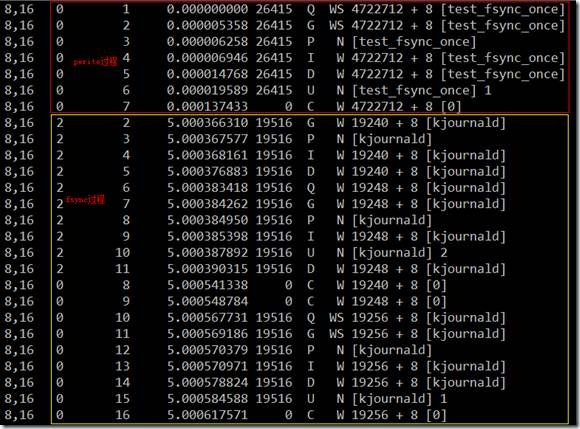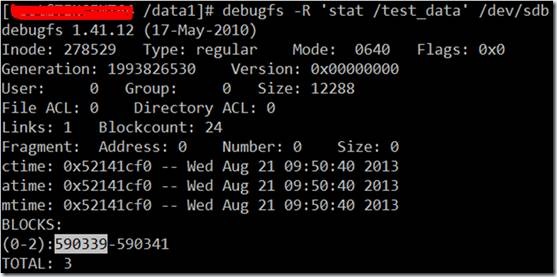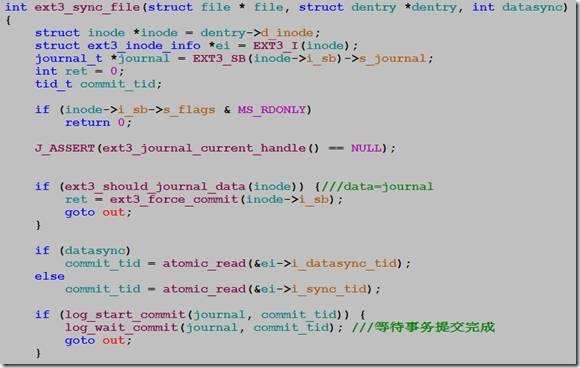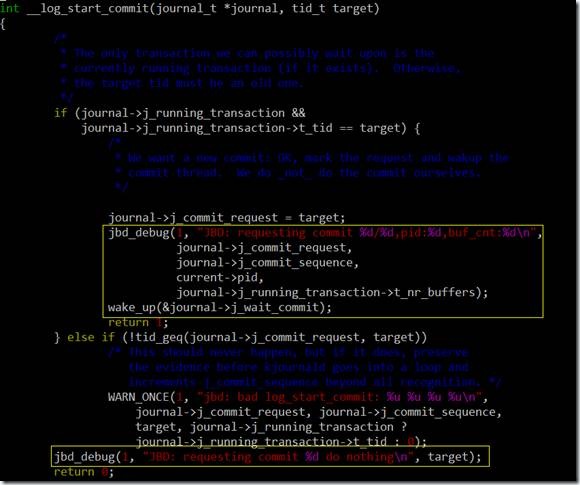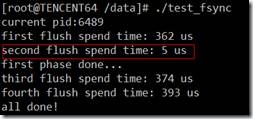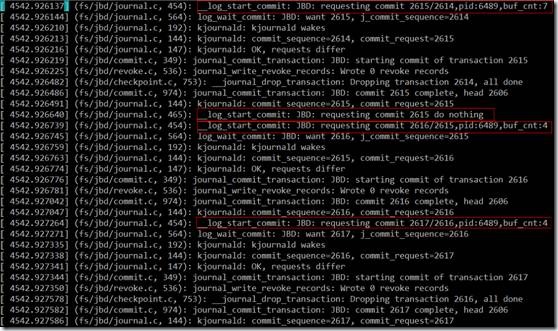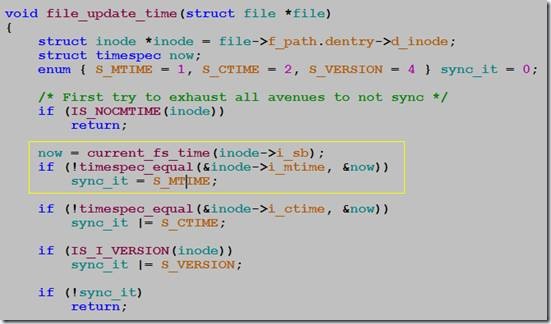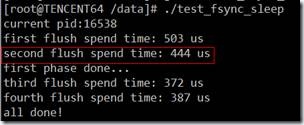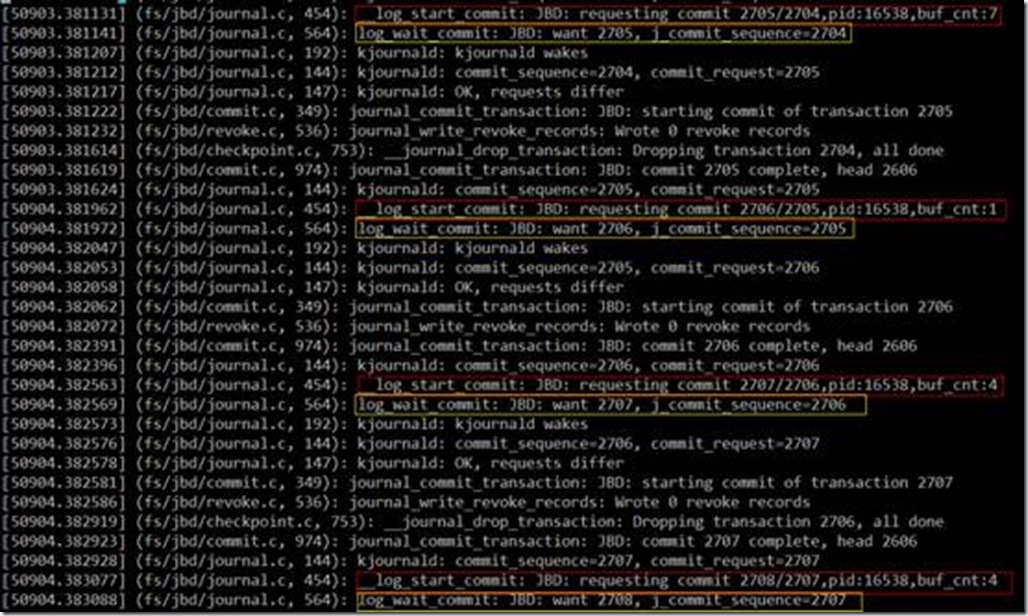http://www.cnblogs.com/hustcat/p/3283955.html
http://www.cnblogs.com/zengkefu/p/5639200.html
http://www.cnblogs.com/zengkefu/p/4943836.html
http://www.cnblogs.com/zengkefu/p/5639200.html
http://blog.sina.com.cn/s/blog_8308bc810102uxhz.html
深入理解Fsync
1 介绍
数据库系统从诞生那天开始,就面对一个很棘手的问题,fsync的性能问题。组提交(group commit)就是为了解决fsync的问题。最近,遇到一个业务反映MySQL创建分区表很慢,仔细分析了一下,发现InnoDB在创建表的时候有很多fsync——每个文件会有4个fsync的调用。当然,并不每个fsync的开销都很大。
这里引出几个问题:
(1)问题1:为什么fsync开销相对都比较大?它到底做了什么?
(2)问题2:细心的人可以发现,第一次open数据文件后,第二次fsync的时间远远小于第1次调用fsync的时间,为什么?
(3)问题3:能否优化fsync?
来着这些疑问,一起来了解一下fsync。
2 原因分析
我们先通过一个测试程序来学习一下fsync在块层的基本流程。
2.1 测试程序1
|
Write page 0 Sleep 5 Fsync |
用blktrace跟踪结果如下:
上半部红色框内为pwrite在块层的流程,下半部黄色框内为fsync在块层流程,中间刚好相差5秒。
4722712为测试文件的第1个block对应的扇区号,590339(block号) * 8=4722712(扇区号)。
无论是pwrite,还是fsync,主要的开销都发生IO请求提交给驱动和IO完成之间,也就是说开自设备驱动。差不多占了整个系统调用的1/2的开销。
另外,可以看到调用fsync时,发生了3次块层IO,起始扇区分别是19240、19248和19256,物理上3个连续的块。实际上这3个块为内核线程kjournald写的日志,分别描述块(2405)、数据块(2406)和提交块(2407)。为了验证,不妨看一下这三个块的实际数据。
19240/8=2405
19248/8=2406
19256/8=2407
块2405:
|
#define JFS_MAGIC_NUMBER 0xc03b3998U #define JFS_DESCRIPTOR_BLOCK 1 #define JFS_COMMIT_BLOCK 2 |
开始的4个字节为JFS_MAGIC_NUMBER,然后是block type:JFS_DESCRIPTOR_BLOCK。
块2407:
的确是提交块。
2.2 fsync的实现
既然fsync的开销很大,就来看看代码吧。
函数ext3_sync_file:
函数log_start_commit负责唤醒kjounald内核线程,log_wait_commit等待jbd事务提交完成。
从代码来看,fsync的主要开销在于调用log_wait_commit后的等待。也就是说fsync要等待kjournald把事务提交完成,才会返回。
到这里,我们已经知道了fsync开销的主要来源:(1)硬件驱动层的开销;(2)ext3写日志。
另外,当log_start_commit返回0时,fsync就不会等待事务提交完成。到这里已经基本可以确认第2次fsync的开销为什么那么小了——没有wait事务提交。
下面验证这一想法。为了方便调试,打开了内核jbd debug日志。
2.3 测试程序2
|
Write page 0 Fsync Write page 0 Fsync Write page 1 Fsync Write page 2 Fsync |
从第2个红框的日志来看,第2次fsync时,的确是没有wait的,所以开销这么小,而其它3次fsync都调用了log_wait_commit函数。
问题4:第2次fsync为什么不会调用log_wait_commit?
因为挂载文件系统的时候,data=writeback,即写数据本身不会写jbd日志。第2次pwrite没有引起文件扩展,只会修改ext3 inode的i_mtime,而i_mtime只精确到second,也就是说第2次pwrite不会引起inode信息改变,所以,不会生成jbd日志,也就不需要等待事务提交完成。
下面验证一下该想法。
2.4 测试程序3
|
Write page 0 Fsync Sleep 1 second Write page 0 Fsync Write page 1 Fsync Write page 2 Fsync |
在第2次pwrite之前,sleep 1秒钟,保证ext3 inode的i_mtime修改。
想法被证实了,第2次fsync的时间回到正常水平。
可以看到,第2次fsync调用提交了新的事务,并调用了log_wait_commit等待事务完成。
3 优化
如何优化fsync?是个难题。
(1)系统减少对fsync的调用。
(2)ext3日志放在更快的存储介质,参考http://insights.oetiker.ch/linux/external-journal-on-ssd/
作者:YY哥
出处:http://www.cnblogs.com/hustcat/
本文版权归作者和博客园共有,欢迎转载,但未经作者同意必须保留此段声明,且在文章页面明显位置给出原文连接,否则保留追究法律责任的权利。
[root@localhost ~]# debugfs -R "stat ./test" /dev/sda2 debugfs 1.39 (29-May-2006) Inode: 3604481 Type: directory Mode: 0755 Flags: 0x0 Generation: 46195286 User: 502 Group: 503 Size: 4096 File ACL: 0 Directory ACL: 0 Links: 3 Blockcount: 8 Fragment: Address: 0 Number: 0 Size: 0 ctime: 0x5768c427 -- Mon Jun 20 21:35:51 2016 atime: 0x57725a43 -- Tue Jun 28 04:06:43 2016 mtime: 0x5768c427 -- Mon Jun 20 21:35:51 2016 BLOCKS: (0):3631328 TOTAL: 1
[root@localhost fs]# find / -name "*.c" | xargs grep "void file_update_time" -rn /usr/src/debug/kernel-2.6.18/linux-2.6.18.x86_64/fs/inode.c:1225:void file_update_time(struct file *file) /usr/src/kernels/linux-2.6.32/fs/inode.c:1460:void file_update_time(struct file *file)
void file_update_time(struct file *file) { struct inode *inode = file->f_path.dentry->d_inode; struct timespec now; enum { S_MTIME = 1, S_CTIME = 2, S_VERSION = 4 } sync_it = 0; /* First try to exhaust all avenues to not sync */ if (IS_NOCMTIME(inode)) return; now = current_fs_time(inode->i_sb); if (!timespec_equal(&inode->i_mtime, &now)) sync_it = S_MTIME; if (!timespec_equal(&inode->i_ctime, &now)) sync_it |= S_CTIME; if (IS_I_VERSION(inode)) sync_it |= S_VERSION; if (!sync_it) return; /* Finally allowed to write? Takes lock. */ if (mnt_want_write_file(file)) return; /* Only change inode inside the lock region */ if (sync_it & S_VERSION) inode_inc_iversion(inode); if (sync_it & S_CTIME) inode->i_ctime = now; if (sync_it & S_MTIME) inode->i_mtime = now; mark_inode_dirty_sync(inode); mnt_drop_write(file->f_path.mnt); } EXPORT_SYMBOL(file_update_time);
[root@localhost jbd]# find / -name "*.c" | xargs grep "int __log_start_commit" -rn /usr/src/debug/kernel-2.6.18/linux-2.6.18.x86_64/fs/jbd/journal.c:427:int __log_start_commit(journal_t *journal, tid_t target) /usr/src/kernels/linux-2.6.32/fs/jbd/journal.c:435:int __log_start_commit(journal_t *journal, tid_t target)
int __log_start_commit(journal_t *journal, tid_t target) { /* * Are we already doing a recent enough commit? */ if (!tid_geq(journal->j_commit_request, target)) { /* * We want a new commit: OK, mark the request and wakup the * commit thread. We do _not_ do the commit ourselves. */ journal->j_commit_request = target; jbd_debug(1, "JBD: requesting commit %d/%d ", journal->j_commit_request, journal->j_commit_sequence); wake_up(&journal->j_wait_commit); return 1; } return 0; }
[root@localhost ~]# strace -f -F -T -r -p 5109 -e trace=write,open,read,fsync Process 5160 attached with 22 threads - interrupt to quit [pid 5160] 0.000000 open("./test/h.frm", O_RDONLY) = 18 <0.000049> [pid 5160] 0.000492 read(18, "3761 f3��201��000��20�5����������210�10�"..., 64) = 64 <0.000062> [pid 5160] 0.000312 read(18, "//�� ��", 7) = 7 <0.000019> [pid 5160] 0.000120 read(18, "j1�20����������������������������"..., 288) = 288 <0.000019> [pid 5160] 0.000154 read(18, "����2�377�", 8) = 8 <0.000020> [pid 5160] 0.000299 read(18, "5�21224) "..., 74) = 74 <0.000018> [pid 5160] 0.202203 fsync(9) = 0 <0.003163> [pid 5160] 0.003619 write(34, "P262yW21���O���'1��10�1�������4��!�"..., 206) = 206 <0.000050> [pid 5124] 0.060908 fsync(9) = 0 <0.003123> [pid 5126] 1.117089 fsync(4) = 0 <0.005403> [pid 5116] 0.008428 fsync(4) = 0 <0.000019> [pid 5126] 0.001892 fsync(4) = 0 <0.000019> [pid 5116] 0.001509 fsync(17) = 0 <0.002887> [pid 5126] 0.004133 fsync(4) = 0 <0.000020> [pid 5117] 0.002916 fsync(4) = 0 <0.000021> [pid 5111] 0.872229 fsync(9) = 0 <0.005205>
[] EXT4 debugging support [ ] JBD (ext3) debugging support JDB调试支持 如果你正在使用Ext3日志文件系统(或者其他文件系统/设备可能会潜在使用JBD),这个选项可以让你在系统运行时开启调试输出,以便追踪任何错误。默认地这些调试输出是关闭的。 如果选Y,将可打开调试,使用echo N > /sys/kernel/debug/bd/jbd-debug,其中N是从1-5的数字,越高产生的调试输出越多。要再次关闭,使用echo 0 > /sys/kernel/debug/jbd/jbd-debug [ ] JBD2 (ext4) debugging support JDB2调试支持 如果你正在使用Ext4日志文件系统(或者其他文件系统/设备可能会潜在使用JBD2),这个选项可以让你在系统运行时开启调试输出,以便追踪任何错误。默认地这些调试输出是关闭的。 如果选Y,将可打开调试,使用echo N > /sys/kernel/debug/bd2/jbd2-debug,其中N是从1-5的数字,越高产生的调试输出越多。要再次关闭,使用echo 0 > /sys/kernel/debug/jbd2/jbd2-debug
journal block device代码分析
进入此门的肯定都对journal block device有一定了解,需要对ext3文件系统有了解,多余的就不赘述。
为什么要设计JBD?
普通数据是存在硬盘上的,文件系统也是作为普通数据存在硬盘上,类似如果碰到突然断电的情况,硬盘就可能损坏,硬件损坏,还是要硬件设计保证,软件设计(JBD)就是解决软件错误,断电可能会导致软件错误,举个例子,文件系统相当于常用的压缩文件,普通数据则是其中一个txt中的文字,如果压缩到一半被杀掉,如果txt中的文字损坏,压缩文件仍能解压,只是txt内容不同而已,但如果压缩文件的结构被损坏,很可能解压不来任何文件。而JBD就是防止文件系统的结构数据(元数据)被损坏,它作为一个缓存块先缓存所有的元数据,如果磁盘数据异常后,就从缓存块中恢复。

JBD的具体工作流程:
如上图示,kernel正常读写磁盘,读磁盘直接获取,写磁盘则走两条路,每个IO群(即事务),先写到jbd里面,然后在写磁盘,如果写磁盘被中断,则从jbd恢复,如果jbd被中断,OK,没影响。jbd本身数据存储到磁盘的一个用户态不可见位置,即日志空间,日志空间本身是一个文件系统结构的存储空间,有超级块,组描述符,位图等,估计所有数据系统都是类似结构。
基本原理就不说了,下面就以ext3_mkdir为例,描述jbd工作机制。
首先通过ext3_journal_start获取原子操作handle,(原子操作即操作不可分割的,只有完成态和未开始状态,不会停留在中间态,和atomic_inc不同,atomic加减是限制多线程冲突,handle则是保证完整性),具体细节可以参考ext3_journal_start函数,我对此的理解是,ext3_journal_start对handle进行了初始化,获取当前journal空间的数据,比如,空闲字节的开始位置。
|
1
2
3
|
handle = ext3_journal_start(dir, EXT3_DATA_TRANS_BLOCKS(dir->i_sb) +
EXT3_INDEX_EXTRA_TRANS_BLOCKS + 3 +
EXT3_MAXQUOTAS_INIT_BLOCKS(dir->i_sb));
|
在后面ext3_new_inode函数中见handle传递进入,在ext3_new_inode中申请新inode,需要修改位图,当然还有超级块和组描述符等,下面截取位图的写入作为一个描述:
|
1
2
3
4
5
6
7
8
9
10
11
12
13
14
15
16
17
18
19
20
21
22
23
24
25
26
27
|
bitmap_bh = read_inode_bitmap(sb, group);
if (!bitmap_bh)
goto fail;
ino = 0;
repeat_in_this_group:
ino = ext3_find_next_zero_bit((unsigned long *)
bitmap_bh->b_data, EXT3_INODES_PER_GROUP(sb), ino);
if (ino < EXT3_INODES_PER_GROUP(sb)) {
BUFFER_TRACE(bitmap_bh, "get_write_access");
err = ext3_journal_get_write_access(handle, bitmap_bh);
if (err)
goto fail;
if (!ext3_set_bit_atomic(sb_bgl_lock(sbi, group),
ino, bitmap_bh->b_data)) {
/* we won it */
BUFFER_TRACE(bitmap_bh,
"call ext3_journal_dirty_metadata");
err = ext3_journal_dirty_metadata(handle,
bitmap_bh);
if (err)
goto fail;
goto got;
}
|
通过read_inode_bitmap获取位图数据bitmap_bh,用ext3_find_next_zero_bit算出空闲ino位置,用ext3_journal_get_write_access获取日志的写权限,更多的是将handle加入事务transaction管理,或者说将bitmap_bh加入到journal管理中,然后才开始进行具体的数据修改,也就是ext3_set_bit_atomic修改位图,修改完成使用ext3_journal_dirty_metadata标记为脏,即告诉journal本次handle操作结束,可以进行提交了。
ext3_new_inode下的组描述符也是类似,包括后面的目录项修改都是如此,也不赘述了。
需要提到的是,此处标记为脏的是元数据,非元数据使用ext3_journal_dirty_data函数,在ext3里面,如果发现当前数据是脏页,则直接进行刷新到磁盘,原因在注释中有描述。
|
1
2
3
4
5
6
7
8
9
10
11
12
13
14
15
16
17
18
19
20
21
22
|
/*
* This buffer may be undergoing writeout in commit. We
* can't return from here and let the caller dirty it
* again because that can cause the write-out loop in
* commit to never terminate.
*/
if (buffer_dirty(bh)) {
get_bh(bh);
spin_unlock(&journal->j_list_lock);
jbd_unlock_bh_state(bh);
need_brelse = 1;
sync_dirty_buffer(bh);
jbd_lock_bh_state(bh);
spin_lock(&journal->j_list_lock);
/* Since we dropped the lock... */
if (!buffer_mapped(bh)) {
JBUFFER_TRACE(jh, "buffer got unmapped");
goto no_journal;
}
/* The buffer may become locked again at any
time if it is redirtied */
}
|
至此,一个使用journal的标准写入过程结束,后续的就是提交了。
jbd有常驻线程kjournald负责提交transaction,kjournald线程每个ext系列的分区分一个,主要部分通过调用journal_commit_transaction完成。需要插播一下,如果编译内核的时候打开CONFIG_JBD_DEBUG或者CONFIG_JBD2_DEBUG开关,就可以根据jbd-debug跟踪jbd的执行过程,有更直接的感觉,在代码实现上就是jbd_debug函数。
具体流程我建议打开debug开关后,对比着看,具体代码不梳理了,直接上图:
jbd前面所有设计都是为了此时的提交,需要留意的是此时设计的普通数据在元数据前进行提交,来保证ordered执行顺序。另外在之前写文件流程中提到ext3_ordered_write_end,中调用walk_page_buffers中journal_dirty_data_fn标记普通数据为脏,会将已脏的数据先用sync_dirty_buffer刷磁盘一下,可以对比参看。
最后则是出问题之后日志进行恢复:
journal恢复是在mount挂载磁盘的时候,ext3_fill_super()一直调用到journal_recover,判断是否进行日志恢复也是如下判断。
|
1
2
3
4
5
6
|
if (!sb->s_start) {
jbd_debug(1, "No recovery required, last transaction %dn",
be32_to_cpu(sb->s_sequence));
journal->j_transaction_sequence = be32_to_cpu(sb->s_sequence) + 1;
return 0;
}
|
即根据日志的超级块s_start参数是否为0判断。
整个恢复过程有3部分组成,都是调用do_one_pass,只是传参不同,第一步获取recovery_info信息,journal的起点和终点,journal是一个循环利用的环状存储介质。第二步获取REVOKE块,第三步PASS_REPLAY则根据描述符块将日志信息写到磁盘上。
另外提一下在工作中碰到一个案例:内核在写文件的时候发生了多次复位,根据内核黑匣子记录的信息,看到journal_bmap获取信息为0,日志被__journal_abort_soft中断 了,再写journal出现了panic。当时看以为bmap出现异常,中间读取有问题,后来把journal日志块倒出来看,对应的一个间接索引块里面全为0,在普通文件中是正常的,称为文件的洞,而日志则是格式化一开始就全分配了,而且顺序读取利用不应产生文件的洞。具体原因再也没找到,但是发现fsck不支持修改journal出现洞的问题,导致重复复位,后来找到社区高版本fsck比对一下,改了一个补丁,勉强算解决了问题。
以上都是开胃小菜,更多的请读代码,文章描述不细致的地方请参考jdb代码分析
—结束—

![clip_image002[5] clip_image002[5]](https://images0.cnblogs.com/blog/23202/201308/26231607-c0c0e2c9e01e4259a9bf4cf25369a85c.jpg)
